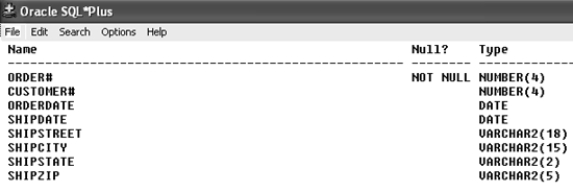Multiple Choice

Structure of the ORDERS table

Structure of the CUSTOMERS table
-Which of the following SQL statements will list the name of each customer stored in the CUSTOMERS table, and, if the customer has placed an order that is contained in the ORDERS table, the order# of any order each customer has placed?
A) SELECT lastname, firstname, order#
FROM customers NATURAL JOIN orders;
B) SELECT lastname, firstname, order#
FROM customers c LEFT OUTER JOIN orders o
ON
C) SELECT lastname, firstname, order#
FROM customers RIGHT OUTER JOIN orders;
D) customer# = o.customer#;
E) SELECT lastname, firstname, order#
FROM customers JOIN orders USING (customer#) ;
Correct Answer:

Verified
Correct Answer:
Verified
Q2: The MINUS set operator is used to
Q10: The JOIN keyword must be used in
Q19: When a self-join is created,each copy of
Q42: A self-join can only be specified in
Q59: If you are joining four tables in
Q66: Which of the following is an example
Q79: Which of the following keywords is used
Q103: When two tables that share more than
Q115: A join based upon a column from
Q116: The outer join operator can only be